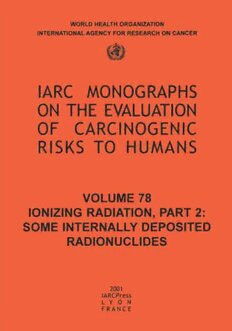Download Ionizing Radiation, Part II: Some Internally Deposited Radionuclides (IARC Monographs on the Evaluation of the Carcinogenic Risks) PDF Free - Full Version
Download Ionizing Radiation, Part II: Some Internally Deposited Radionuclides (IARC Monographs on the Evaluation of the Carcinogenic Risks) by IARC in PDF format completely FREE. No registration required, no payment needed. Get instant access to this valuable resource on PDFdrive.to!
About Ionizing Radiation, Part II: Some Internally Deposited Radionuclides (IARC Monographs on the Evaluation of the Carcinogenic Risks)
This monograph evaluates the evidence for carcinogenicity of ionizing radiation from internally deposited radionuclides. The radionuclides considered in this monograph belong to two broad categories: those that emit a-particles (helium nuclei) and those that emit b-particles (electrons) during their primary radioactive decay. For purposes of this monograph 'internally deposited' refers to radionuclides in dispersed forms (e.g. dusts suspensions solutions or gases) that enter the body through inhalation ingestion by some form of injection or in some cases by percutaneous absorption. Radionuclides may also enter tissues within removable objects, such as radioactive beads needles etc. that may be implanted surgically for therapeutic purposes or other kinds of fragments implanted accidentally. These kinds of exposures are not considered in this volume. Also not considered are radionuclides (e.g. iron-55 gallium-67) which undergo radioactive decay through processes that do not include emission of either a or b particles. Radon and its decay products were previously evaluated in IARC Monographs Volume 43 (1988) as carcinogenic to humans (Group 1). The subsequently published scientific literature on occupational and residential exposures to radon was reviewed and included in this volume as an update but no re-evaluation of radon was considered necessary. Six specific radionuclides of the elements radium thorium plutonium and phosphorus plus mixed radionuclides of iodine were evaluated as carcinogenic to humans (Group 1) on the basis of sufficient evidence for increased risk of cancer in exposed individuals. These include radium-224 radium-226 radium-228 thorium-232 (administered in colloidal form as thorium-232 dioxide) plutonium-239 (exposure to which also entails exposure to plutonium-240 and other isotopes of plutonium) radioisotopes of iodine including iodine-131 and phosphorus-32. Evidence for increased cancer risk in exposed humans is from medical usage in the cases of radium-224 thorium-232 and phosphorus-32 and from occupational or accidental/environmental exposures for plutonium-239 radium-226 and radium-228 and the radioiodines. In addition the global evaluations of two broad categories of internally deposited radionuclides were made on the basis of carcinogenicity in experimental animals plus other relevant data: Internally deposited radionuclides that emit a particles are carcinogenic to humans (Group 1). Internally deposited radionuclides that emit b particles are carcinogenic to humans (Group 1). Ionizing Radiation Part 1: X-and Gamma (g) Radiation and Neutrons Volume 75 of the Monographs addressed the carcinogenic potential of external X-rays g-rays and neutrons in exposed populations (see overleaf).
Detailed Information
| Author: | IARC |
|---|---|
| Publication Year: | 2001 |
| ISBN: | 9789283215851 |
| Pages: | 617 |
| Language: | English |
| File Size: | 3.108 |
| Format: | |
| Price: | FREE |
Safe & Secure Download - No registration required
Why Choose PDFdrive for Your Free Ionizing Radiation, Part II: Some Internally Deposited Radionuclides (IARC Monographs on the Evaluation of the Carcinogenic Risks) Download?
- 100% Free: No hidden fees or subscriptions required for one book every day.
- No Registration: Immediate access is available without creating accounts for one book every day.
- Safe and Secure: Clean downloads without malware or viruses
- Multiple Formats: PDF, MOBI, Mpub,... optimized for all devices
- Educational Resource: Supporting knowledge sharing and learning
Frequently Asked Questions
Is it really free to download Ionizing Radiation, Part II: Some Internally Deposited Radionuclides (IARC Monographs on the Evaluation of the Carcinogenic Risks) PDF?
Yes, on https://PDFdrive.to you can download Ionizing Radiation, Part II: Some Internally Deposited Radionuclides (IARC Monographs on the Evaluation of the Carcinogenic Risks) by IARC completely free. We don't require any payment, subscription, or registration to access this PDF file. For 3 books every day.
How can I read Ionizing Radiation, Part II: Some Internally Deposited Radionuclides (IARC Monographs on the Evaluation of the Carcinogenic Risks) on my mobile device?
After downloading Ionizing Radiation, Part II: Some Internally Deposited Radionuclides (IARC Monographs on the Evaluation of the Carcinogenic Risks) PDF, you can open it with any PDF reader app on your phone or tablet. We recommend using Adobe Acrobat Reader, Apple Books, or Google Play Books for the best reading experience.
Is this the full version of Ionizing Radiation, Part II: Some Internally Deposited Radionuclides (IARC Monographs on the Evaluation of the Carcinogenic Risks)?
Yes, this is the complete PDF version of Ionizing Radiation, Part II: Some Internally Deposited Radionuclides (IARC Monographs on the Evaluation of the Carcinogenic Risks) by IARC. You will be able to read the entire content as in the printed version without missing any pages.
Is it legal to download Ionizing Radiation, Part II: Some Internally Deposited Radionuclides (IARC Monographs on the Evaluation of the Carcinogenic Risks) PDF for free?
https://PDFdrive.to provides links to free educational resources available online. We do not store any files on our servers. Please be aware of copyright laws in your country before downloading.
The materials shared are intended for research, educational, and personal use in accordance with fair use principles.

